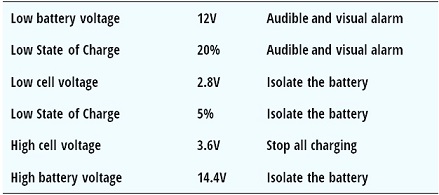Battery management
Just as there is no standard size of battery for an RV, there is no one size fits all for battery management either.
Battery management or battery monitoring?
The acronym BMS is bandied about a lot in the world of RVs and batteries. It's so ubiquitous that it's easy to overlook the absence of an explanation.
With battery monitoring, you become the manager. Warnings may sound if your battery voltage gets too high or too low and it's up to you to stop charging or discharging the battery as required.
Battery management does all this for you automatically and informs you of the state of your battery whenever you want to know. Also, if any parameters exceed the "notify" level, the BMS will issue an audible warning before the system goes into self-protection mode if the problem deteriorates further.
We install a battery management system
A successful battery management system needs to measure a number of things in order to accurately report the available capacity and the health of the battery, and whether the cells are balanced or not. These are the things a good BMS will measure:
- All power going into your battery, be it from solar, mains or DC to DC charging
- All power going out of your battery, either via your inverter or directly to 12V appliances
- The voltage of each of the battery's cells
- The total voltage and capacity of the battery
Our T1 Lithium measures and works with the following parameters:

If any cell voltage reaches 2.8V, or the capacity falls to 20% state of charge (SOC), a warning will sound to let you know that soon you will need to lessen the load on the battery and/or provide charge, such as running the engine and a DC to DC charger, plugging into mains or running a generator. If you're about to go to bed and turn off lights and TV, and the weather forecast for the next day is good, there's no need to do anything. The audible alarm can be turned off, but you'll still get a visual reminder.
If you're not there to hear that alarm or you ignore it, and any cell voltage drops to 2.8V or the SOC to 5%, our battery management system will automatically isolate your battery so that no more power can be discharged from it. You may lose the food in your fridge, but it will be somewhat cheaper than replacing your battery.
Our BMS will automatically stop charging when any cell reaches 3.6V, or if the charge controller hasn't stopped the charging already, regardless of where the charge is coming from, as the T1 Lithium BMS interfaces with all of them.
Power from all inputs
Our system will accept charge from solar, mains and DC to DC at the same time. You don't need to choose between one or the other. Your lithium battery will accept as much charge as you can give it - and as fast as you can give it - until the battery is full.
Most solar controller / DC to DC charger / battery charger combos will only let you have one form of charging at a time. We're still happy to use that equipment if you already have it and can work with that restriction. But the equipment we use on a new install will all run independently as well as together.

The importance of cell monitoring
If you take care of the cells, the battery will be OK. A custom-built T1 Lithium system monitors cell voltage and though discrepancies don't happen often, they can be easily corrected if required - we provide both the means and the instructions.